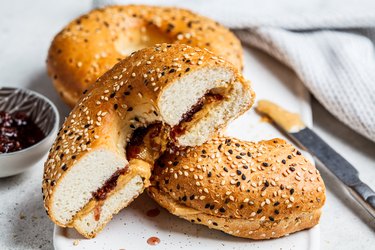
For athletes prepping for sports tryouts, the road to getting that coveted spot can be strenuous and stressful, both mentally and physically. One major factor that can help prepare you — and even give you an advantage — is fueling properly.
Eating before your tryout will help ensure a steady supply of glucose (aka energy) circulating in your bloodstream so your body can perform at its very best.
Video of the Day
Video of the Day
Below, Amy Stephens, RDN, CSSD, sports dietitian for Empire Elite Track Club in New York City, shares her tips on how athletes aiming to tryout for high school or collegiate sports can fuel before tryouts.
Tip
For individualized fueling recommendations, talk to a sports dietitian.
Types of Food to Eat Before Sports Tryouts
The average athlete is about 140 to 150 pounds and should typically take in 50 grams of carbs and 10 grams of protein — about 300 to 400 calories — 1 to 2 hours before sports tryouts or exercise, Stephen says.
The carbohydrates should primarily be complex carbohydrates (think: whole grains or brown rice). Complex carbs take longer to digest than simple carbs (think: candy, cookies, donuts) and release glucose into the bloodstream at a steadier pace.
It's best to avoid foods with lots of fiber, added sugar and saturated fat before sports tryouts because they are harder to digest and may leave you feeling sluggish. Some examples of these types of foods include salads, fried foods or fast foods.
If Tryouts Are in the Morning:
*All nutrition info below is sourced from the United States Department of Agriculture (USDA).
- Bagel with peanut butter (465 calories, 62g carbs, 18g protein)
- Two slices of toast with peanut butter (342 calories, 33g carbs, 15g protein)
- Oatmeal with a large apple (316 calories, 64g carbs, 8g protein)
- Cereal, like Cheerios (200 calories, 39g carbs, 6g protein)
If Tryouts Are in the Afternoon or Evening:
- Peanut butter and jelly sandwich (405 calories, 48g carbs, 15g protein)
- Large banana (121 calories, 31g carbs, 1.5g protein)
- Dried apricots (68 calories, 17g carbs, 1g protein)
- Dried mangos (112 calories, 19g carbs, 1g protein)
- Bagel (277 calories, 55g carbs, 11g protein)
- Pasta with marinara sauce (286 calories, 52g carbs, 10g protein)
- Brown rice (218 calories, 45g carbs, 4.5g protein)
Tip
If your sports tryouts are longer than 1.5 hours, bring snacks — such as a granola bar, pretzels, dried fruit, fresh fruit or drink with electrolytes — to refuel.
Other Helpful Tips for How to Fuel Before Sports Tryouts
1. Start a Schedule
While fueling in the hours before tryouts is most important, Stephens recommends getting into a good schedule about 2 to 3 days before tryouts to get your body ready.
Most athletes, especially those in high school, tend to skip breakfast, losing out on the opportunity to improve performance throughout the day, according to Stephens.
"Food can help give you the edge to perform at your best — to give a kick versus a crash," she says.
Be mindful to get in three full, balanced meals — plus snacks — each day at regular times throughout the day. For a snapshot of what your should look to have, Stephens suggests your plate should be 1/2 carbs, 1/4 protein and 1/4 vegetables.
2. Learn to Listen to Your Body
The specific amounts of food and drink we need to take in are so individualized.
"What works for one athlete might not work for another, and some foods might also not sit right," Stephens says.
Her suggestion: Don't test new things the day of tryouts. In the weeks leading up to the tryouts, test any new types of food or fuel and see how you feel when you exercise.
3. Consider the Type of Exercise You'll Be Doing
How you fuel for a sports tryout also depends on the specific type of sport you're venturing into. For instance, what to eat before soccer or volleyball tryouts may be different from wrestling tryouts.
While carbohydrates and hydration is important for all, there are some differences. Wrestlers might need more protein (1.7 to 1.8g per kilogram of body-weight) where anyone running might need less (1.4 to 1.5g per kilogram of body-weight), according to Stephens.
"In general, if you're going into an endurance sport, such as soccer or cross-country, you'll need more carbs," Stephens says.
4. Remember Fuel Also Includes Hydration
Drinking enough water is very important, but it's also extremely individualized. A good rule of thumb is to check your urine, according to Stephens.
"If your pee is dark yellow, you should drink more water," she says.
She recommends drinking 20 ounces of water about one hour before practice and sipping water as needed throughout the tryout.
"If your urine is pale yellow more than an hour after sports, you might need electrolytes. If your pee is clear and you're chugging water and still not feeling good, that's another sign you might need electrolytes," Stephens says.
She suggests adding more salt ahead of time to your foods, including your morning oatmeal or powdered drinks that contain extra sodium.